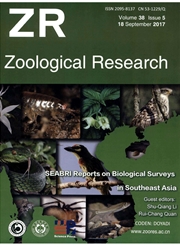

 中文摘要:
中文摘要:
Until recently,the agamid species,Japalura flaviceps,was recognized to have the widest geographic distribution among members of the genus occurring in China,from eastern Tibet to Shaanxi Province.However,recent studies restricted the distribution of J.flaviceps to the Dadu River valley only in northwestern Sichuan Province,suggesting that records of J.flaviceps outside the Dadu River valley likely represent undescribed diversity.During two herpetofaunal surveys in 2013 and 2015,eight and 12 specimens of lizards of the genus Japalura were collected from the upper Nujiang(=Salween)Valley in eastern Tibet,China,and upper Lancang(=Mekong)Valley in northwestern Yunnan,China,respectively.These specimens display a unique suite of diagnostic morphological characters.Our robust comparisons of phenotype reveal that these populations can be distinguished readily from J.flaviceps and all other recognized congeners.Herein,we describe the two Japalura lineages as new species,Japalura laeviventris sp.nov.and Japalura iadina sp.nov..In addition,we provide updated conservation assessments for the new species as well as imperiled congeners according to the IUCN criteria for classification,discuss the importance of color patterns in the diagnosis and description of species in the genus Japalura,and discuss directions for future taxonomic studies of the group.
 英文摘要:
英文摘要:
Until recently, the agamid species, Japalura flaviceps was recognized to have the widest geographic dis- tribution among members of the genus occurring in China, from eastern Tibet to Shaanxi Province. However, recent studies restricted the distribution of J. flaviceps to the Dadu River valley only in north- western Sichuan Province, suggesting that records of J. flaviceps outside the Dadu River valley likely represent undescribed diversity. During two herpeto- faunal surveys in 2013 and 2015, eight and 12 specimens of lizards of the genus Japalura were collected from the upper Nujiang (=Salween) Valley in eastern Tibet, China, and upper Lancang (=Mekong) Valley in northwestern Yunnan, China, respectively. These specimens display a unique suite of diagnostic morphological characters. Our robust comparisons of phenotype reveal that these populations can be distinguished readily from J. flaviceps and all other recognized congeners. Herein, we describe the two Japalura lineages as new spe- cies, Japalura laeviventris sp. nov. and Japalura iadina sp. nov.. In addition, we provide updated con- servation assessments for the new species as well as imperiled congeners according to the IUCN crite- ria for classification, discuss the importance of color patterns in the diagnosis and description of species in the genus Japalura, and discuss directions for future taxonomic studies of the group.
 同期刊论文项目
同期刊论文项目
 同项目期刊论文
同项目期刊论文
 期刊信息
期刊信息
